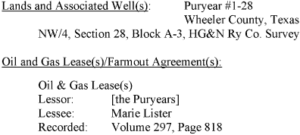June 2020 Newsletter – New Case Update: Piranha Partners v. Neuhoff
New Case Update: Piranha Partners v. Neuhoff, 596 S.W.3d 740 (Tex. 2020), reh’g denied (Apr. 17, 2020)
By: Yvette Hershey
Quick Summary:
In a 7-2 decision delivered on February 21, 2020, the Texas Supreme Court in Piranha Partners v. Neuhoff (the “Piranha Case”) held that language in an Assignment conveyed interest in production under a mineral lease covering the entire tract of land instead of just a single well.
In Depth Analysis:
In 1975, Neuhoff Oil & Gas (“Neuhoff”) purchased an undivided two-thirds interest in a mineral lease known as the Puryear Lease. The lease—originally between the Puryears (and others) as lessors and Marie Lister as lessee—covered all of the minerals under a tract of land referred to as Section 28 (the “Leased Premises”). A few years later, Neuhoff sold and assigned its two-thirds interest but reserved for itself a 3.75% overriding royalty interest on all production under the Puryear Lease.
Only one well was completed on the Leased Premises from 1975-1999: the Puryear B #1-28 well (“Puryear Well”). Neuhoff received royalty payments from the producing well until it sold its royalty interest at auction in 1999, and Piranha Partners (“Piranha”), the successful bidder, was assigned Neuhoff’s interest (the “Assignment”).
After Piranha’s purchase, the operator of the Puryear Lease successfully drilled 3 more wells on the property. The operator paid royalty interests to Neuhoff asserting Neuhoff had only sold at auction its interests in the Puryear Well. However, in 2012, the operator had title opinions drafted which found that Piranha owned interests in production from all wells drilled under to the Puryear Lease and not just interest in the Puryear Well. Neuhoff subsequently filed suit.
Interpreting any deed or contract requires that the court enforce the parties’ intent as expressed within the four corners of the agreement. Only if the language within the agreement is determined to be ambiguous (e.g. there are different but reasonable interpretations of the agreement) does the court go beyond the four-corners rule. Perryman v. Spartan Tex. Six Capital Partners, Ltd., 546 S.W.3d 110, 117–18 (Tex. 2018).
The granting clause in this case provides in pertinent part:
[Neuhoff Oil] does hereby assign, sell and convey unto [Piranha] … without warranty or covenant of title, express or implied, subject to the limitations, conditions, reservations and exceptions hereinafter set forth … all of [Neuhoff Oil’s] right, title and interest in and to the properties described in Exhibit “A” (the “Properties”).
Other pertinent clause in this case provides:
All oil and gas leases, mineral fee properties or other interests, INSOFAR AND ONLY INSOFAR AS set out in Exhibit A … whether said interest consists of leasehold interest, overriding royalty interest, or both ….
Exhibit A provides in pertinent part:

The granting clause requires the court to turn to Exhibit A, but nothing in either the granting clause or Exhibit A specifically identifies whether the well, the land, or the lease is the scope of interest conveyed.
Piranha argued that because the language in the Assignment is ambiguous, general rules of construction principles must be applied, specifically the following:
- The Assignment must be construed by conferring upon grantee the greatest estate the confines of the instrument will permit. Waters v. Ellis, 158 Tex. 342, 312 S.W.2d 231, 234 (1958).
- The court must to reject any alleged exception, reservation, or limitation that is not expressly and clearly stated in the written document. Perryman, 546 S.W.3d at 11.
- Ambiguities must be resolved against the party who draft the Assignment. Garrett v. Dils Co., 157 Tex. 92, 299 S.W.2d 904 (1957).
In response, Neuhoff argued that these construction rules do not apply because the Assignment is unambiguous and one could determine the parties’ intent simply by harmonizing its language. Citizens Nat. Bank in Abilene v. Tex. & P. Ry. Co., 136 Tex. 333, 150 S.W.2d 1003 (1941).
The Court determined it would apply a “holistic and harmonizing” approach to construing the Assignment, which requires it give equal weight to all clauses and provisions in the Assignment Luckel v. White, 819 S.W.2d 459 (Tex. 1991). The Court determined the Assignment’s other provisions unambiguously express an objective intent to convey Neuhoff’s overriding royalty interest in the Puryear Lease, covering all of Section 28. Thus, the Court held the Assignment unambiguously conveyed to Piranha all of the interest that Neuhoff owned at the time of the conveyance.
Looking Ahead: What does this mean for you?
When E&Ps are divesting assets, the Exhibits are often prepared by the Land Department while the text of the conveyance documents are often prepared by outside counsel. This case illustrates the importance of harmonizing these two aspects of the conveyance document to ensure that the E&P is conveying exactly what it means to convey—no more and no less.
At RR&A, we work closely with and ensure that our clients understand exactly what is being conveyed and how it may impact their business. If you have any questions or concerns regarding the cases mentioned in this Newsletter, do not hesitate to reach out to R. Reese & Associates at (832) 831-2289 or info@rreeselaw.com.
Recent News
FTC Bans Non-Compete Agreements April 23, 2024 written by Tannon Symm On Tuesday, April 23,
FTC Bans Non-compete Agreements Update June 28, 2024FTC Bans Non-Compete Agreements Update June 28, 2024 written by Tannon Symm According to the
Getting What You Pay For: Title Due DiligenceGetting What You Pay For: Title Due Diligence written by Kaysha Spoon When purchasing assets,
To Bind or Not to Bind? Letters of IntentTo Bind or Not to Bind? Letters of Intent written by Miranda Caballero A Letter
Crude Data: Resolving Buyer Overload in Acquisition Due DiligenceCrude Data: Resolving Buyer Overload in Acquisition Due Diligence written by Andrew Clinton We’ve all
Uncovering Encumbrances: What Lies on the Surface for Renewable and Energy Transition Projects?Uncovering Encumbrances: What Lies on the Surface for Renewable and Energy Transition Projects? written by

